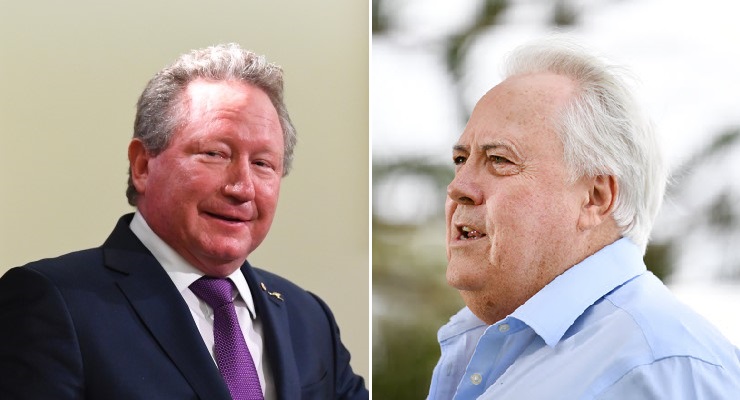
While the G7 summit is shining a torch on Scott Morrison’s outsider status on climate change, you can expect a bigger spotlight on both parties’ position in Queensland once the starter’s gun fires on the federal election campaign.
And it might come less from the candidates and more from two billionaires gearing up to battle it out for influence in the key seats that could come into play if the government is ousted.
The two are the mining billionaires Clive Palmer and Andrew “Twiggy” Forrest — with “Twiggy” hinting at a counter play to Palmer’s advertising blitz, which helped swing working-class regional Queensland voters away from Labor in 2019.
The challenge for Labor (and its leader Anthony Albanese is trying) is to draw them back, and that means reassuring them that Labor isn’t going to sell their jobs down the drain with climate change policies attractive particularly to the inner-city green-leaners deserting the major parties.
Palmer represents the face of brute capitalism. He’s made his fortune from mining, is an old-fashioned Queensland National in his thinking, and likes to throw around his considerable weight.
Forrest has come to represent the face of woke capitalism. Yes, he’s resources rich but he’s on several other missions: Indigenous education, reforming Australian rugby, and driving to reduce global carbon emissions — partly through technology that will take coal out of steel production.
Yesterday at the Australian Petroleum Production & Exploration Association’s conference, Forrest slammed Santos and Woodside over investing in multibillion-dollar liquified natural gas projects, attacking both over their “disgraceful experience and disgraceful track record with their carbon emissions”.
Forrest and Palmer are from our big resource-rich states: Palmer Queensland; Forrest Western Australia. But given their deep pockets and differing views on coal, their paths are bound to collide in central Queensland when a federal election is called.
Ever so quietly, Forrest has revealed his plans to throw some of his ever-expanding fortune at an advertising campaign that will target the very workers Palmer has been pitching his political messages at for the past decade.
A few weeks ago he told The Australian Financial Review (which puts him top of its Australian rich list) that he wants to persuade coal workers there is a future for them if the world turns away from carbon. And that will involve millions of dollars poured into the dwindling media outlets of regional Queensland.
While Labor’s dilemma in supporting its worker base while shutting down its industry is getting the most visibility thanks to the efforts of Joel Fitzgibbon in the Hunter Valley, the numbers at stake in central Queensland make it a more interesting battlefield.
Flynn wide open
At stake is the electorate of Flynn, which is up for grabs with the retirement of the LNP’s Ken O’Dowd. Popular Gladstone Mayor Matt Burnett has been chosen by Labor to win back that seat.
Capricornia is also front and centre of the next battle, having been stolen from Labor by the LNP’s Michelle Landry in 2013.
But more than 4300 full-time employees in the seat of Dawson, for example, are directly employed by the coal sector, according to the Queensland Resources Council.
While the local votes will naturally follow the leaders, the future of coal and its jobs will come very much to the fore, irrespective of the current electoral margins. This had a run in the last election, when Palmer ran an advertising blitz for his eponymous Palmer United Party — which failed to win a seat but delivered a swag of preferences to Scott Morrison.
And he was helped by the misguided efforts of the Greens to run an anti-coal campaign bus through the coal heartland. Voters who rely on coal for their jobs, whose wealth is tied up in houses that will be worthless if mines shut, didn’t appreciate the preaching and went for the candidate who promised them a future: Morrison.
We should all be concerned about the potential for big money to influence political outcomes. While the rules control who can donate, they do not prevent anyone turning their money into advertising, which can persuade voters to support one side or another.
It’s unlikely Forrest will be so blatant. But his determination to spend money to convince coal workers they won’t lose their homes and jobs may have an influence. At the very least, it puts him head-to-head with Palmer.
It also raises another interesting question: what are the green energy jobs that can replace the high incomes the coal industry pays its workers? And how far away are they?
They are the big questions for either side of politics as they wrestle with the issues of climate change. Meanwhile, coal prices keep rising, emissions aren’t falling fast enough, and the hot air remains in abundance.








I wonder what the world would look like if people like bank tellers, petrol pump attendants, DVD rentals, etcetera had the same sort of voting clout as miners. Times change, and some jobs become redundant, no matter how much you kick and scream about it. Seriously, how happy would the voting population be if they were denied TV and movie streaming services in order to keep a DVD store in operation?
I don’t think it was the clout of the miners that made the big difference. It was the coalition looking after their donors.
They’ll still be just as important as donors when, sooner rather than later, the mines are 98% automated.
The main employees will be a machine watcher and a dog – the dog’s job will be to bite the machine watcher if they attempt to touch anything.
Something seems fundamentally broken in Australian politics when the message is that we need to keep particular industries because that’s the only path to prosperity for the people employed in them. We talk about this notion of an agile workforce, but more and more it seems as little more than a justification of the casualisation of the workforce and the need for more individuals to move into the low-paying gig economy!
Didn’t stop them killing the car industry.
Then again, those were most likely Labor voters, so it doesn’t count.
I think at the point the car industry was finally put down, it could only really be described as a mercy killing. There’s a limit as to how many times the government can reach into its own pockets to prop up a dying industry. Coal isn’t quite there yet, and won’t be for a while. It also helps that coal plays into the culture wars whereas whether a car is made here or overseas didn’t *really* matter that much.
genuinely curious, where do you stand on the latest submarine build?
I have no strong opinion about it.
“Stack the indigenous land-owner meeting, St Twiggy’s a-comin’!”
Any “analysis” of politics, state or federal by King is tainted by her Coalition sympathies. Who will Forrest and Palmer preference? …. Her Coalition?
“Bloody green energy jobs – as if”? How far away?
…. To Right, there’s hot air in abundance.
Until these parasites start paying a fair share of tax, then they shouldn’t be allowed anywhere near our elections.
Now expand that worthy idea. You mighy find it a religious experience
Perhaps it would help if the Labor Party promised jobs and training for redundant miners.Seems an obvious course for the LP to pursue.
As with Forestry Commission when it was clearing eucalyptus to plant pines – often using prison populations, at least in southern NSW.
The original intention was that the trees be pruned and thinned but that was found to be too labour intensive (sic!) so they were left to overgrow until mass felled by chainsaws and carted by big trucks by ral men as god intended.
Similarly, alternative jobs are not macho enough for the meatheads of the CFMMEU & AWU.
…”run by real men..”.